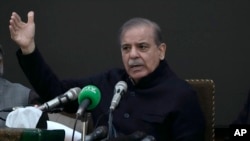Pakistan’s former prime minister, Shehbaz Sharif, was nominated as the country’s next chief executive Tuesday after a key political party pledged support for his candidacy to end uncertainty stemming from the country’s disputed elections last week that left no clear winner.
Sharif’s Pakistan Muslim League-N (PML-N) made the announcement after emerging as the single largest party with 80 seats in Thursday’s vote but not enough for a simple majority in the 266-seat National Assembly or lower house of Parliament.
The Pakistan Peoples Party (PPP) of former Foreign Minister Bilawal Bhutto Zardari is second with 54 seats, while smaller regional parties secured the rest.
Zardari told reporters in Islamabad that his party would provide the needed votes in parliament to elect Sharif as prime minister in order to restore political stability in the country.
“This is why I will not be putting myself forward for the candidacy of the prime minister of Pakistan,” said the 35-year-old son of slain former Prime Minister Benazir Bhutto. "We don’t want to see a perpetual crisis in our country."
But Zardari said his party would not participate in the Cabinet, and analysts said that could lead to a weak and unstable government in the nuclear-armed South Asian nation of about 241 million people.
Imprisoned former Prime Minister Imran Khan warned PML-N and PPP against forming a government with “stolen votes,” renewing claims that his Pakistan Tehreek-e-Insaf (PTI) won a “resounding 2/3rd [two-thirds] majority” in Thursday’s elections.
Independent candidates affiliated with the Pakistan Tehreek-e-Insaf (PTI) party of Khan have won 92 seats, making them the largest group. However, they have not won enough to form a simple majority, and because they ran as individuals, they cannot form a government on their own.
Khan issued a statement from prison through his family in response to the announcement by the two bitter PTI rivals that they would join forces to form the future political setup.
“As the people of Pakistan have clearly pronounced their verdict, there is a dire need for democracy and fairness in Pakistan's elections,” the 71-year-old politician stated.
“I warn against the misadventure of forming a government with stolen votes. Such daylight robbery will not only be a disrespect to the citizens but will also push the country’s economy further into a downward spiral,” Khan added.
The PTI has alleged that the vote was rigged and has legally challenged some results. The caretaker Pakistani government and the election commission have rejected those allegations.
On Tuesday, the PTI announced that it had decided to form a coalition with a smaller party called Majlis Wahdat-e-Muslimeen Pakistan so it could claim reserved seats in the lower house.
Khan, a cricket star turned prime minister, was ousted from power in 2022 through an opposition parliamentary vote of no confidence, a move he said was orchestrated by Pakistan’s powerful military, plunging the country into political turmoil.
The deposed leader is in jail after being convicted and sentenced to lengthy prison terms on controversial charges of corruption, violating a marriage law and revealing state secrets while in office. Khan denies any wrongdoing and accuses the military of orchestrating the convictions and scores of other charges against him to keep him from returning to power.
The election commission barred the PTI from contesting the polls as a unified political entity in the lead-up to the vote, forcing its nominees to run as independents.
Political uncertainty comes as Pakistan grapples with an economic crisis, slow growth and record inflation. The country’s security forces have also been struggling to tackle a spike in militant attacks nationwide.
A $3 billion bailout from the International Monetary Fund helped Pakistan narrowly avert bankruptcy last year. The program is set to end in April.
The new government will need to negotiate a fresh financial package with the IMF as cash-strapped Islamabad faces $25 billion of external debt payments in the fiscal year that begins in July.
Pakistani President Arif Alvi will convene the inaugural National Assembly session by the end of this month, in accordance with the constitution. The session will allow newly elected members to be sworn in before the house elects the new prime minister.




